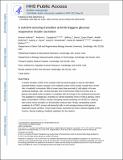A Nutrient-Sensing Transition at Birth Triggers Glucose-Responsive Insulin Secretion
Author(s)
Helman, Aharon; Cangelosi, Andrew L; Davis, Jeffrey C; Pham, Quan; Rothman, Arielle; Faust, Aubrey L; Straubhaar, Juerg R; Sabatini, David M; Melton, Douglas A; ... Show more Show less
DownloadAccepted version (2.784Mb)
Publisher with Creative Commons License
Publisher with Creative Commons License
Creative Commons Attribution
Terms of use
Metadata
Show full item recordAbstract
A drastic transition at birth, from constant maternal nutrient supply in utero to intermittent postnatal feeding, requires changes in the metabolic system of the neonate. Despite their central role in metabolic homeostasis, little is known about how pancreatic β cells adjust to the new nutritional challenge. Here, we find that after birth β cell function shifts from amino acid- to glucose-stimulated insulin secretion in correlation with the change in the nutritional environment. This adaptation is mediated by a transition in nutrient sensitivity of the mTORC1 pathway, which leads to intermittent mTORC1 activity. Disrupting nutrient sensitivity of mTORC1 in mature β cells reverts insulin secretion to a functionally immature state. Finally, manipulating nutrient sensitivity of mTORC1 in stem cell-derived β cells in vitro strongly enhances their glucose-responsive insulin secretion. These results reveal a mechanism by which nutrients regulate β cell function, thereby enabling a metabolic adaptation for the newborn.
Date issued
2020Department
Massachusetts Institute of Technology. Department of Biology; Whitehead Institute for Biomedical Research; Koch Institute for Integrative Cancer Research at MITJournal
Cell Metabolism
Publisher
Elsevier BV